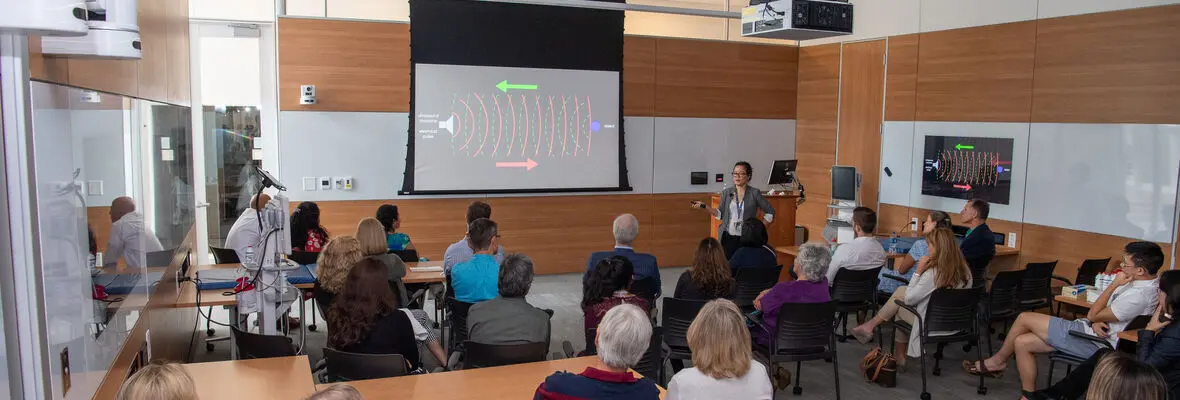Resources & Tips
Here are some resources to help Penn medical students navigate their research experience - whether short term or year out:
MENTORSHIP
Academic Mentoring - How to Give It and How to Get It - JAMA article by Allan Detsky and Mark Otto Baerlocher.
Research Plan Discussion sheet - the Combined Degree Office encourages year out students to use this sheet as a reference, when they meet with their mentor at the beginning of the fellowship year.
SMART Goals - a year out research student made the following recommendation, "Creating and implementing clear goals is the key to success in any research opportunity, and I believe the SMART Goals framework is an excellent way to get started. This guidepost really allows you to think through what you want to achieve in a manner that keeps both you AND your mentor accountable to a timeline."
LITERATURE SEARCH
The Biomedical Library has a myriad of resources and experienced staff who can help you with your research projects. On their Medical Students Guide, you will find resources such as:
- Resources to find research articles
- Schedule a consult with a librarian to discuss your information needs (e.g. help you dig into research questions and launch projects)
TUTORIALS / TECH GUIDES
The Biomedical Library has Tutorials you can watch on popular tools such as Excel, Google Scholar, Powerpoint, Prezi, etc.
LinkedIn Learning (formerly Lynda) training is available for free to all Penn faculty, students, and staff with a valid PennKey. For more information, visit: Penn Computing: LinkedIn Learning website.
Khan Academy online statistics lectures - a student found the lectures really helpful in understanding basic statistics.
NIH Core Curriculum in Clinical Research - free courses offered include: Introduction to the Principles and Practice of Clinical Research (IPPCR); Principles of Clinical Pharmacology (PCP); and Ethical and Regulatory Aspects of Clinical Research. These courses are offered as distance learning courses.
PRESENTATIONS / POSTERS
Journal Clubs
- Improving Journal Club Presentations, or, I Can Present That Paper in Under 10 Minutes - Evid. Based Med. article by Mark Schwartz, Deborah Dowell, Jaclyn Aperi, and Adina Kalet.
Scientific Presentations
- How to Give Scientific Presentations - PPT by Dr. Angie DeMichele, program leader of the former Doris Duke Clinical Research Fellowship program.
Poster Advice / Templates
Here are a couple online resources that may help guide you in creating a scientific poster:
- NIH Creating and Presenting Dynamic Posters videocast
- Colin Purrington's Designing Conference Posters webpage
- Biomedical Library - Poster Design webpage
For Penn poster templates and logos, visit Penn Libraries - Digital Media Services for Health Sciences - Template and Logos.
Poster Printing
Students can go to any printing place such as Kinkos, Staples, Slidemakers, etc. to print a large poster. On campus resources include:
- Weigle Information Commons (WIC), Van Pelt-Dietrich Library - Vitale Digital Media Lab
- Biomedical Library
- University Copy Service in Houston Hall
Presenting at a Conference
PSOM medical students who are accepted to present at a conference can receive up to $500 per fiscal year (July 1 - June 30) to cover costs related to presenting their research including registration, transportation, lodging or printing. Please reach out to Mike Sabara, Director of Financial Services for approval and to initiate the reimbursement process.
ABSTRACTS / MANUSCRIPTS
Abstracts
- Writing an Abstract - PPT by Dr. Rachel Kelz, program co-leader of the former Doris Duke Clinical Research Fellowship program.
Manuscripts
- Manuscripts and Grants - PPT by Dr. Anil Rustgi, presenter of the former Doris Duke Clinical Research Fellowship program.
- Writing It Up: A Step-by-Step Guide to Publication for Beginner Investigators - AJR article by Mark Kliewer.
- Authorship Form - this JAMA form will give you an idea of the criteria for authorship.
- The History and Meaning of the Journal Impact Factor - JAMA article by Eugene Garfield.
- Recommendations for the Conduct, Reporting, Editing, and Publication of Scholarly work in Medical Journals - recommendations by the International Committee of Medical Journal Editors (ICMJE).
- Ten Principles to Improve the Likelihood of Publication of a Scientific Manuscript - AJR article by James Provenzale.
Editing Assistance
- Postdoctoral Editors Association - provides free, confidential editing services to all CHOP and Penn community members of a variety of documents including manuscripts, abstracts, grant proposals, and slides/posters for meetings. The PEA is a group of postdoctoral fellows organized as an adjunct of the Biomedical Postdoctoral Council. This group has volunteered to assist postdoctoral authors in articulating their thoughts by editing scientific manuscripts for language usage, punctuation, and organization. This service was designed specifically to answer the request of many postdoctoral researchers for whom English is a second language, but we anticipate that it will be useful for any postdoctoral researcher engaged in scientific writing. This service is intended to optimize the interaction of postdoctoral researchers and their mentors during the process of preparing a manuscript for publication by minimizing the time they spend on basic writing skills. Postdoctoral Editors Association members, while endeavoring to clarify meaning, will provide only minimal scientific review of manuscripts as this critical dialogue during the process of preparing a manuscript should occur between postdoctoral researchers and their mentors.
AWARDS
Research Paper Prize Competition - A competition every winter where Perelman med students submit their research papers to win prizes.
RESOURCE SUGGESTIONS
Prezi: Presentation Software - some students have suggested Prezi as an alternative to Power Point.
Khan Academy online statistics lectures - a student found the lectures really helpful in understanding basic statistics.
Google Scholar Button for Firefox - a Penn librarian suggested the Google Scholar Button to make easy access to Google Scholar.
ORCID - BGS is encouraging their graduate students to obtain an ORCID ID. ORCID is a way of managing your publications and other scholarly activity. It’s free to use and integrates well with other citation databases, including PubMed and Scopus, and many publishers and some grant funders now require an ORCID ID for submissions.


